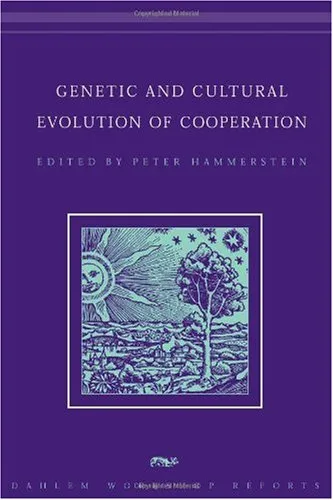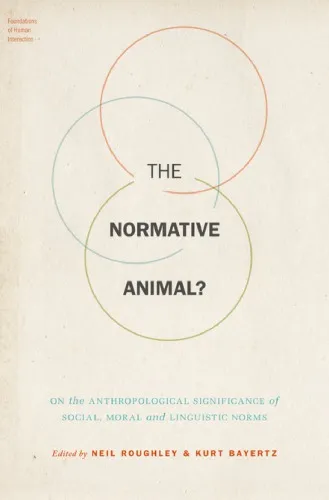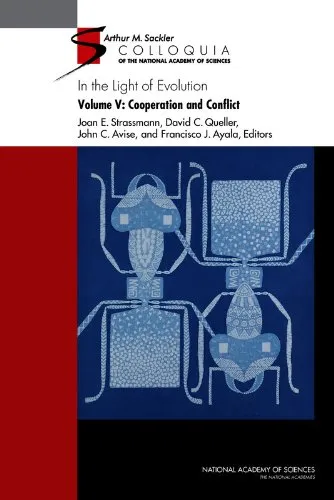Genetic and Cultural Evolution of Cooperation
4.5
Reviews from our users

You Can Ask your questions from this book's AI after Login
Each download or ask from book AI costs 2 points. To earn more free points, please visit the Points Guide Page and complete some valuable actions.Related Refrences:
Introduction
The book Genetic and Cultural Evolution of Cooperation explores one of the most fascinating and fundamental aspects of life—cooperation. Authored by Peter Hammerstein, this book delves into how cooperative behaviors emerge, evolve, and persist in both cultural and biological contexts. Spanning interdisciplinary insights from evolutionary biology, anthropology, economics, and psychology, this book examines the intersection between genetic predisposition and cultural dynamics in shaping cooperation across diverse settings.
What does it mean to cooperate, and why do we, as humans and organisms, often choose mutual benefit over personal gain? This question has intrigued scientists and philosophers for centuries. Genetic and Cultural Evolution of Cooperation offers readers an academically rigorous yet accessible exploration of this topic, shedding light on the evolutionary mechanics of cooperation and its relevance in today’s world. With contributions from distinguished scholars, the book provides a comprehensive understanding by combining case studies, theoretical models, and experimental research.
Detailed Summary of the Book
The book is organized around the idea of cooperation as a fundamental strategy employed by both genetic entities (like genes and organisms) and cultural systems (such as human societies and institutions). It delves into these concepts across a collection of essays and studies, tackling diverse contexts in which cooperative behavior manifests and evolves.
The first section provides a genetic perspective, focusing on how natural selection fosters cooperation despite its apparent conflict with individual self-interest. Concepts like kin selection, reciprocal altruism, and game theory receive particular attention, helping the reader understand the evolutionary framework underlying cooperative behavior.
Next, the book transitions to cultural evolution, emphasizing how behaviors and norms are transmitted across generations through learning and imitation. It explores the ways in which human culture fosters cooperation through mechanisms such as institutional structures, moral norms, and shared beliefs. Intriguingly, it highlights how the interplay between genetic programming and cultural systems can lead to more complex cooperative strategies than would be possible through genetics or culture alone.
The book also delves into empirical research, offering a variety of examples from the animal kingdom and human societies. Ant colonies, primate social systems, and human economic models serve as key examples, demonstrating the universality and variability of cooperation as a strategy. By drawing on these examples, Hammerstein shows that the principles governing cooperation apply across scales, from microbial interactions to global political dynamics.
Key Takeaways
- Cooperation emerges as an evolutionary advantage, balancing individual needs with collective well-being.
- Both genetic selection and cultural evolution contribute to the development and persistence of cooperative behaviors.
- Game theory and mathematical modeling are critical tools for understanding the mechanisms behind cooperation.
- Human societies use cultural adaptations, such as norms and institutions, to overcome challenges to sustained cooperation.
- Cooperation is not solely restricted to humans and can be observed in a wide array of biological systems.
Famous Quotes from the Book
"Cooperation is not simply the absence of competition. It is a sophisticated strategy, one that is ingrained in the very DNA of life itself."
"Human culture stands as the pinnacle of cooperative evolution, a testament to what is possible when genetic and cultural forces align."
Why This Book Matters
The importance of Genetic and Cultural Evolution of Cooperation lies in its ability to provide a framework for understanding why cooperation is at the heart of life itself. In a world fraught with conflict and competition, this book offers a hopeful perspective by showing how cooperative strategies are both natural and essential to survival. By bridging the gap between genetics and culture, the book delivers profound insights into the shared human experience and the mechanisms driving societal evolution.
Furthermore, the book's interdisciplinary approach makes it relevant for policymakers, educators, and anyone interested in fostering cooperation in real-world scenarios. Whether applied to environmental issues, business ethics, or global diplomacy, the lessons within these pages are highly applicable in addressing the most pressing challenges of our time.
Ultimately, the book reminds us that cooperation is not just a virtue but a necessity—an enduring thread that weaves through the evolutionary fabric of life.
Free Direct Download
You Can Download this book after Login
Accessing books through legal platforms and public libraries not only supports the rights of authors and publishers but also contributes to the sustainability of reading culture. Before downloading, please take a moment to consider these options.
Find this book on other platforms:
WorldCat helps you find books in libraries worldwide.
See ratings, reviews, and discussions on Goodreads.
Find and buy rare or used books on AbeBooks.
1356
بازدید4.5
امتیاز0
نظر98%
رضایتReviews:
4.5
Based on 0 users review
Questions & Answers
Ask questions about this book or help others by answering
No questions yet. Be the first to ask!













